With the situation when the child does not want to go to kindergarten, many parents are familiar firsthand. In some cases, problems arise already in the first days of visiting a preschool institution. In others, the baby suddenly begins to act up when it is necessary to go to the garden, despite the fact that he used to like it there.
There are parents who follow the lead of the kids and try to organize their leisure time at home, without even trying to delve into the causes of the problem. But for the most part, people still appreciate the convenience of social organization and are not ready to give it up, so they make every effort to identify and eliminate the factors that provoke inconvenience.
The main reasons why children refuse to attend kindergarten
The very first hysteria is not a reason to sort things out with the child or kindergarten teachers, especially if it is not motivated by anything. In the event of a repetition of the situation, it is already worth thinking about the possible reasons for such a development of events. Most often, the problem is as follows:
- The child has difficulty communicating with other children. This can be provoked by the spoiledness of the child himself, his isolation or aggressiveness. In some cases, the presence of physical features or defects (glasses, stuttering, skin pigmentation, ethnic characteristics) plays a role.
- The child is not yet ready to visit Kindergarten. If parents do not initially accustom their children to the regime, communication with other people, obedience, then they definitely will not be able to learn all this in a few days in the kindergarten. Quite the contrary, such things will be perceived by the baby with hostility, especially if everything was allowed to him before.
Tip: Do not delay the first visit to kindergarten. The smaller the baby, the faster his adaptation will pass. On average, it takes 3-4 days for a child to do this. But if you try to send a sleek and spoiled 5-year-old peanut into an unfamiliar environment, then the probability of problems is at least 90%.
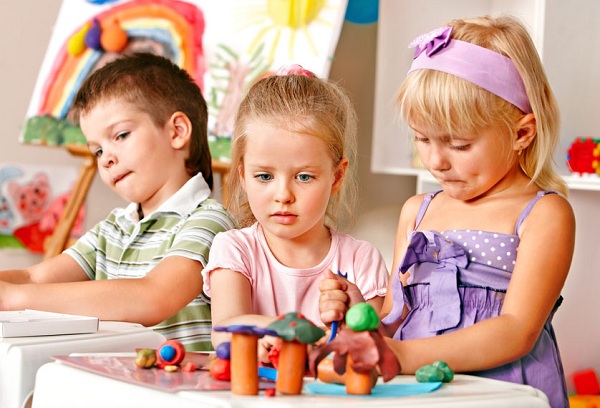
- The kid had to go to a new kindergarten. A new environment is stressful for most children, even if they went to the first kindergarten with pleasure. This may be the result of their yearning for friends and caregivers, or the difficulty of infusing into an already formed team.
- The child does not like the attitude of the teacher towards him. According to statistics, the reason for the refusal of the little ones from visiting preschool institutions in 30% of cases is associated with the aggressiveness, authoritarianism or dryness of the teacher. It’s not that you don’t want to go to such a person, the child is just scared.
- Some children cannot get used to a new environment. Not as tasty as mom's food. Strict rules of conduct. Mandatory sleep at different times from home. All these factors put pressure on the child. If for several years he lived according to a special regime, then it is always difficult for him to rebuild.
- Strained relationships with parents, problems in the family. Sometimes it happens that children do not just not want to go to kindergarten, they just do not want to leave home. Problems within the family, parents' indifference to the baby or to each other, a recent divorce or the death of someone close are events that put pressure on the child's psyche from the inside, provoking depression. It also happens that it seems to children that if they are taken to kindergarten, then one day they simply will not be taken away.
- The child is strained by specific activities in the kindergarten. Often children are ready to give up all the pleasant moments associated with attending preschool because of just one annoying factor. For example, the teacher oversaturates the lessons with actions too much, and the kid simply does not have time to do everything. Sometimes the opposite happens - classes are boring or monotonous. Some kids can't stand kindergarten cuisine, and sometimes it's really hard to disagree with that.
- The baby lacks certain skills that other children have. If initially the parents did not set as their goal the self-development of the child, hoping that this is exactly what kindergarten teachers will do, a number of problems can be provoked in this regard. A newcomer cannot dress himself, tie a shoelace, brush his teeth, wash his hands ... All this causes ridicule or jokes from more independent children, injuring the child's psyche.
- Individual features of the development of babies. Today, pediatricians are increasingly diagnosing developmental features in young patients. If with some of them the child can safely attend a regular kindergarten group, then with others it will be necessary to consider the option of placing him in a specialized institution.

In most cases, it is absolutely useless to directly ask children why they refuse to attend kindergarten. Often they themselves do not suspect what the reason is. Here you will either have to connect all your powers of observation and the skills of a psychologist, or go to a specialized specialist.
Verbal form of protest and hysteria
Children rarely try to hide the fact that attending kindergarten does not give them pleasure. Most often, they use verbal protests as a weapon, but they can manifest themselves in different ways:
- The kid calmly, for example, before going to bed, talks about what happened today in the group, imperceptibly showing discontent or aggression towards the situation. In this case, you just need to wait until he forgets about what happened and do not focus on the problem, unless, of course, his stories and complaints are repeated with enviable regularity.
- Negative information falls out on the parents in the morning, during the preparations for the kindergarten. It is accompanied by convulsive protests, tears, screams. It is often difficult to understand the meaning of such an outburst, the child does not give any arguments. With such a development of events, it is better to be late for kindergarten, but wait until the baby calms down to try to sort out the situation. It is likely that the little one just hurts or becomes intoxicated against the background of a cold, and he simply cannot put it into words.
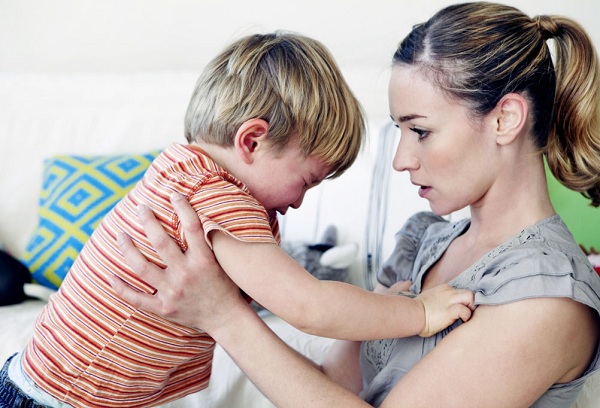
An extreme form of protest is hysteria. During such attacks, children do not notice anything around, do not respond to attempts to calm them down. They can literally beat their heads against the floor and wall, not noticing the pain, injuring themselves. This state cannot be random. Either the reason why the child refuses to go to the garden is really good, or the baby has some kind of failure in terms of mental or emotional development. It is better not to risk it, and go with him to an appointment with a psychologist, psychotherapist, neurologist.
Hidden forms of protest
At a slightly older age, children already understand that going to kindergarten is something like their duty, so they do not always express their protests openly. Parents are advised to pay increased attention to children whose behavior is characterized by the following features:
- When going to kindergarten, the child is obviously playing for time, trying to postpone leaving the house as much as possible.
- Uses all his boundless imagination to come up with a day off without a kindergarten. In the course are fictitious diseases, bad weather, interesting film on TV, dog illness, grandma's visit and more.
- In the morning, the baby, although he does not openly show his unwillingness to leave the house, is in a depressed mood. In the evenings, he rejoices when he is taken away and tries to leave the institution as soon as possible. This is repeated day after day.
- If a scene arises in games that involves going to kindergarten, the baby develops it with a conflicting or tragic bias. When drawing kindergarten, caregivers or group friends, children can use dark tones or aggressive shading.
- The child begins to suffer from insomnia and loss of appetite.

If at least one of the listed factors is found, you should not rush to take the crumbs from the habitable institution and transfer it to a new one. This does not always help solve the problem. First you need to understand the reason for the development of such a situation. It is possible that everything will be resolved quickly and painlessly.
How to find out the reason for the refusal?
Identifying the annoying factor is already half the battle. To get to the point faster, you can use the following rules and recommendations:
- First of all, you need to talk with the child, but naturally, in between times. When taking him out of the kindergarten, you should ask how the baby’s day went, what he learned new today, with whom he talked. In 80% of cases, this is enough to find out the cause of the situation.
Tip: It happens that children try to tell their parents about their problems by projecting situations onto other people. For example, the boy Kolya tells every day that the second boy Kolya is offended in the group. In fact, there may not be such a child in the kindergarten at all.
- You can also talk to the teacher. Calmly, without pretensions, even on abstract topics. It is during empty conversations that parents often learn a lot about their children, their environment, and the educator himself.
- It is worth talking with other parents of children from the kindergarten. If there are not isolated cases of refusal of babies in the group, it is worth organizing a meeting and trying to figure out the situation together.
- The results provide a fairly clear picture. psychological tests. The simplest option is for a child to create a drawing of his garden. Use by a small artist bright colors indicates his positive attitude towards the institution, dark - negative. It is also worth asking your child to portray a teacher, other children from the group.
In addition, you can ask the teacher to show the crafts made by the baby, the results of the classes. It is worth comparing them with the products of other children. If the difference is obvious, and it is not in favor of the child, it is worth working with him at home additionally.
The right approach to eliminate adverse factors
It is necessary to act depending on the type of reason that provokes the situation. The main thing is to do everything gently, without pressure. The child does not even need to know why certain manipulations are being carried out, otherwise he can only fence himself off from help more strongly.
- Children who have problems in communicating with other children need to be more actively introduced into various groups. Frequent walks, playing on playgrounds, trips to amusement parks, visiting a swimming pool or a water park will liberate the baby and increase his level of social activity.
- You should not always indulge the baby in everything, try to pamper him. We must not forget that, considering themselves democratic parents, many people fundamentally stifle the independence of the child, his responsibility to others.
- Today, the situation with kindergartens is such that soon after the birth of a baby, one has to queue for a group. There is a positive point in this - you can understand in advance what kind of routine children live in the garden and project it onto your baby. This allows children to quickly and painlessly adapt to new conditions.
- Subordination and respect for the demands of older children must be taught from an early age.
- If the problem is the low qualification of the staff, from which all children in the group suffer, it is not necessary to transfer your child, it is better to consult with other parents and get more professionally savvy people appointed to positions.
- It is necessary to change the garden in case of a personal conflict between the child and the teacher, if it cannot be resolved peacefully.

If possible, it is worth watching the child while he is in the group. It may get answers to all questions and fail, but the picture will become clearer.
The importance of timely detection and elimination of pathologies
One of the reasons why children are reluctant to attend kindergarten is that they have developmental features that make them stand out from the crowd. Parents should remember that:
- If the baby's burr or stutter seems cute to them, and they believe that the children will outgrow it, then this will give other children a reason for teasing and ridicule. Any deviations from the norm should be treated in a timely manner and only under the supervision of a specialist.
- The presence of a number of pathologies (cerebral palsy, Down's syndrome, autism, oligophrenia, hearing and vision impairments) implies the transfer of the child to a specialized institution. You should not insist that the baby should develop in a group with ordinary children; in a specialized kindergarten, he will be more comfortable and calmer.
- Increased emotionality and sensitivity is not a reason to lock a child behind seven locks and transfer to home education. You just need to visit a psychologist and consult with him about relaxation therapy.
In addition, every little man should be protected from stress as much as possible. You do not need to make him a witness to quarrels between parents, even if they are domestic and frivolous. Any little thing can be deposited in the children's subconscious.
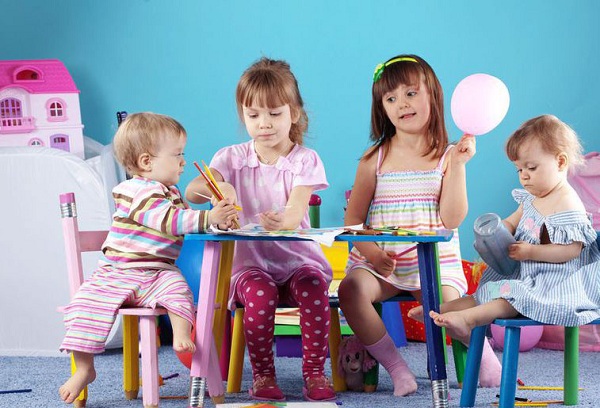
Things that are strictly prohibited
Despite the fact that the approach to each baby should be individual, parents often make the same mistakes, trying to find a way out of the situation. There are tricks and manipulations, resorting to which is not recommended:
- It makes no sense to scold children, their nerves are already on the limit. Upbringing in harsh tones will only exacerbate the situation.
- No need to resort to bribery. Promising gifts in return for going to kindergarten will only lead to the fact that the baby will understand how easy it is to get what he wants with the help of tantrums.
- If everything possible is done to solve the problem, and the child continues to act up out of habit, you will have to learn to be firm at the sight of a sweet, tearful face.
- The option with an attempt to go to the kindergarten every other day does not work. The kid will soon get used to it and it will be difficult for him to explain that you need to visit the institution every day.
With all this, one cannot completely ignore the whims of the guys without trying to understand the situation. Do not lie to children, promising that today is a short day and they will be picked up in an hour or two. So they simply stop believing in all adults and withdraw into themselves.
Kindergartens were created for the convenience of parents and the comprehensive development of children. Taking into account the constant employment of adults, children's institutions have received their wide demand. Perhaps some of us would refuse to use this option and leave the child near us for the whole day, but not everyone really has such an opportunity. The situation when a little man does not want to go to kindergarten, unfortunately, is not uncommon. And the reason lies not so much in the existing conflicts with anyone, but in the fact that the child simply lacks parental attention and warmth. He wants to spend more time with his mother, and she persistently escorts him to a strange aunt in a group. However, the options may be different. Below are effective tips from a psychologist, with the help of which parents can understand the reasons for this behavior of the child.
Toddlers often throw tantrums in the morning, refusing to go to kindergarten. What to do if the situation is slowly but surely getting out of control? In any case, you should not get annoyed in response and try to force the baby to do what you expect from him. Listen to him, because he asks for your attention. The more you focus on yourself and everyday problems, the further you become from your own child. If he has difficulties and does not want to go to the garden, then something is really wrong. Don't let the process drift. Take care of your baby's feelings.
Causes
If you take a closer look at your own offspring, you can find a lot of reasons for refusing to attend kindergarten. It seems to us, adults, that the baby is simply capricious and does not want to obey generally accepted norms. In fact, a child can really suffer, and behind the fact that he does not want to go to kindergarten, there is a serious problem.
Rough handling
It is no secret that in modern children's institutions, kids are not always calm and comfortable. Yes, maybe no one really offends them there, but affectionate treatment is not found everywhere either. Educators and nannies today are forced to work for a very modest salary, which is why they have a bad mood, which is transferred to children. It can be very difficult to separate yourself from the situation you are in. Of course, there are no excuses for being rude to children. First of all, it is necessary to preserve a human face and dignity. Not all people can open their hearts towards children, not everyone works according to their vocation. Sometimes people who don't like children go to work in kindergartens. A large number of children every day causes anger and irritation in such employees. Who suffers from this? Of course, children! Now imagine that among the whole group there is also your beloved child. Should a child from an early age endure disrespectful attitude, all sorts of insults? It's unfair! We, adults, force the baby to go to kindergarten, endure various inconveniences there. And then we conduct lengthy speeches about the fact that the child should see and receive all the best in life.
Moment of adaptation
If you just sent the baby to kindergarten, you should hardly be surprised that he cries there. After all, he has to change his usual environment, part with his mother for the whole day. Just think how scary that is! The home atmosphere warms and relaxes, while someone else's is alarming, frightening. The child simply cannot feel comfortable and easy in such a situation. Imagine that the most precious thing in life is taken away from you and forced to endure separation from your loved one for a long time. For a baby of two or three years, time goes much more slowly than for us. An hour of separation for him may seem like an eternity, an insurmountable barrier. One can only guess what unprecedented suffering covers him when his mother seeks to leave as soon as possible.
Group conflicts
Children, like all other people, quarrel among themselves. Sometimes it can be quite difficult for them to agree due to age characteristics, they still do not know how to restrain emotions. If your child does not want to go to the garden, there must be an explanation for this. The advice of other parents is unlikely to come in handy, because everyone's situations are purely individual. Conflicts in the group can unsettle, create a negative attitude towards the kindergarten in general and form a persistent reluctance to go there. Is it necessary to say that children are sometimes extremely cruel towards each other? They do not tolerate the weak, are overly straightforward, express their thoughts aloud without embarrassment. Delicate and home child there will always be a little uncomfortable among those who do not go into their pocket for a word.
Lack of parental attention
![]()
Not all children are surrounded by sufficient love and attention. It's not that their parents don't care about them. It's just that in the conditions of modern reality it is not always possible to find a free evening in order to communicate with your child, listen to him, show your feelings. There is such a factor as a banal lack of time. Unfortunately, in modern society people sometimes work so hard that there is simply no time and energy left for anything else. Some parents work from dawn to night and do not have the opportunity to spend much time with the baby. As a result, the child himself suffers: he feels lonely and abandoned. Such a baby can throw tantrums every morning and refuse to go to kindergarten.
How to be parents
Of course, each of us wishes only good for his precious offspring. No one wants to make the baby suffer, bring him additional grief. There are so many things in life that make us sad. What should caring moms and dads do? If it is impossible to reduce the working day, you will have to resort to tricks and come up with ways to stay with the baby longer. How to make him cry less and go to kindergarten with pleasure? To achieve this goal, you need to take a few simple steps.
Dosed approach
It is most reasonable to accustom the baby to kindergarten gradually. Do not rush to part with him in the foster group. It is better to leave the house a few minutes earlier and spend more time with him than to rush, rush and offend the child even more. If only mother knew how important this warm contact is for him, how he waits for her every evening after dinner! You should not leave the baby in the garden for a long time if he has not yet got used to the children's team, is not used to the group regime. For a baby, a lot of stress is generally separated from the mother, being away from a loved one. You can sometimes notice how newly arrived children refuse to do anything with everyone, cry and do not want to go to the group. Undoubtedly appetite and sleep suffer.
If your baby is going to kindergarten, try to introduce him to the group and the guys in advance. There is nothing complicated in this action: at first they leave it for no more than an hour in an environment unfamiliar to him, then the time is gradually added. So the child can quickly adapt to new conditions. When you can leave him for the whole day, he will already get used to it and will gladly go to play with his favorite toys.
Creating a calm environment
In order for a child to feel comfortable in the garden, it is necessary to make sure that at home he feels protected from everything in the world, understands that he is loved. Do not be afraid to spoil your baby, often say affectionate words to him. If the baby refuses to go to the group with everyone, pat him on the head, say that you will definitely pick him up in the evening. This will give him confidence and strength for the coming day, in order to spend it for the benefit of himself. Going to kindergarten for a baby is the same as for an adult to visit his workplace. Children every day are in a team that they cannot avoid, and they get very tired of each other. Sometimes it is enough to look at the child in the evening to understand this. The kid misses his parents and only dreams of finding himself next to loved ones as soon as possible.
At home, the baby should feel comfortable and at ease. Try to expand his living space as much as possible so that he can move freely around the rooms. During the day, he will accumulate energy that he wants to throw out. When children feel loved at home, they will go to kindergarten with pleasure. This phenomenon is explained by the fact that a favorable atmosphere has a positive effect on the psyche.
Resolving conflicts on time

All emerging difficulties must be clarified in a timely manner. In the event that resentment accumulates, it is difficult to maintain an adequate perception of the situation. People are so often subject to delusions and illusions. What can we say about a small child who is just beginning to live? In kindergarten, children may quarrel several times during the day, and this is completely normal. The child often worries about the unfair attitude of educators towards him. Be attentive to your child so as not to miss the first visible signs of trouble. If a child is often unfairly punished, be sure to find out why this is happening and stop all such attempts. A child should not tolerate insults from adults.
If you become aware that one of the children offends your baby, the matter should not be left to chance. Due to inaction, the child may think that everyone has abandoned him and no one is interested in him. The first thing a caring parent should do is try to protect the child from attacks from the offender. When it comes to children, you need to be more subtle. Go pick up the baby yourself, do not entrust this responsible task to anyone. Only in this way can you see the true picture and take some steps. It happens that a son or daughter does not want to tell their mother about their social contacts. If the child is silent and does not share any experiences, this is not a good signal to take into account.
Don't let everything go by itself
It is much more convenient to pretend that you do not notice anything, that nothing serious is happening. We all, to one degree or another, tend to justify our own inaction. People often serve false values instead of correcting their mistakes. If you notice something strange in the behavior of the child, you should not hope that everything will go away on its own. The kid always needs help in everything. Children preschool age will not achieve great success if parents do not support them in new endeavors. Some children know how to hide their mistakes, but they do it not as skillfully as adults. With babies, you must always be on the alert so as not to miss important changes in the development of consciousness.
Trusting relationship
Many parents ask what contributes to establishing better contact with their own child? The answer is so obvious that everyone will understand: trusting relationships. Children should feel that mom and dad will always accept their choice. The child wants to feel safe at home and is in great need of parental protection and care. He will “check” with the help of his actions how much you love and accept him for who he is. Some parents do not withstand such serious tests, break down, clutch their heads, do not know what to do. All this can be avoided if you know how to approach your own child. Who better than parents should know and understand him best?
Joint walks, various activities and hobbies contribute to the development and formation of higher trust. Children should feel that adults understand and accept their individuality in everything. Try to allocate time for communication with the baby and, if possible, devote at least two hours daily. On weekends, you can take a walk in the park, participate in various contests, rides, go to the movies for a cartoon, eat delicious ice cream. Children are very fond of surprises and various family activities. Only in this way do they feel loved and in demand in their own family.
Pay more attention
The child must know that the parent will always remain by his side, no matter what act he does. This understanding is born from trust and is very expensive. Even if you have a lot of things to do on Monday and a disgruntled boss, put all your problems out of your head for the weekend and try to focus on interacting with your children as much as possible. It is necessary to pay due attention to everyone, find an individual approach to both your son and daughter. You yourself will be pleased when you see the shining eyes of your heirs, their contented, happy faces. If you spend enough time with the kids, pay attention to them daily, there should be no problems with going to kindergarten. Most often, children begin to suffer from a lack of parental attention. And when love and care are in abundance, it remains only to fully enjoy life. In addition, while relaxing with your children, you yourself can gain additional strength, recharge with the necessary energy.
Kindergarten to your liking
Today there are absolutely no restrictions in the choice educational institutions. You, as a parent, have a unique opportunity to decide which kindergarten to send your child to. Especially pretentious mom and dad can explore all possible rooms in advance in order to make their child's stay within the walls of the children's institution as convenient and comfortable as possible. Who cares about the benefits and development of the child, he will stop at the very the best option. No one limits parents in choosing a kindergarten for a baby. After all, it is so important to remain confident that he will be calm and comfortable there, like at home. Take the baby for a few days, see what his reaction to the environment will be. It may very well be that you will stop at some option that will completely suit you. If the child care facility is selected with love, and not at random, then the child will adapt much faster.
Thus, the problem when a child refuses to attend kindergarten has its own solution. No need to yell at the baby, force him to go to the group by force or influence in another negative way. You should always first try to understand the situation, to understand what drives your baby. It may very well be that, having found the true cause of the difficulty that has arisen, you want to radically change something and make the child's life as joyful and happy as possible.
by the most best age to start attending a preschool is 2.5-3 years. Previously, the psyche of the crumbs is not ready to cope with stress and communication with strangers. Until the age of three, the connection with the mother is so strong that no teacher, even the most attentive, can replace her. But sometimes the circumstances are such that the baby has to be sent to a preschool.
In order to facilitate adaptation to the nursery, play with peers more often, learn to communicate with children. Cook at home food that is as close as possible to the kindergarten menu. Knowing how to use a potty, hold a spoon, drink from a mug, put on trousers and sandals will make life much easier for your baby.
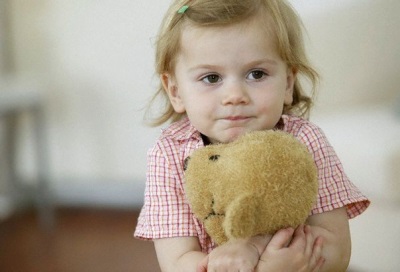
When the time comes to send the offspring to a preschool institution, every mother understands that this is an important stage in life. And it comes with a lot of hardships.
Causes
- The desire of parents is not formed- it's scary for their child, it seems to them that the baby is sickly, not physically developed enough, peers and teachers will offend. Unconsciously, they transmit nervousness to their baby, a healthy reaction is the desire to stay at home.
- Own memories are negative. If the parents themselves were disgusted when they visited the kindergarten, they remember how hard it was for them there, the offspring absorbs from them that this place is bad. Why go where it's bad?
- Fear of the future. It is difficult for a mother to let go of her child, it is difficult to change her usual life, where all the time was devoted to worries. Feeling the subconscious fears of his parents, he seeks to maintain harmony in the family.
- Great responsibility. If dad and mom attach great, often too much, importance to the development of a preschooler, expressing this with intolerance: “Natasha has already mastered the potty, but you haven’t.” Giving the baby an unbearable burden, you contribute to the development of fears. And he chooses the safest place - the house, because new trials await him in the kindergarten, with which he is afraid not to cope.
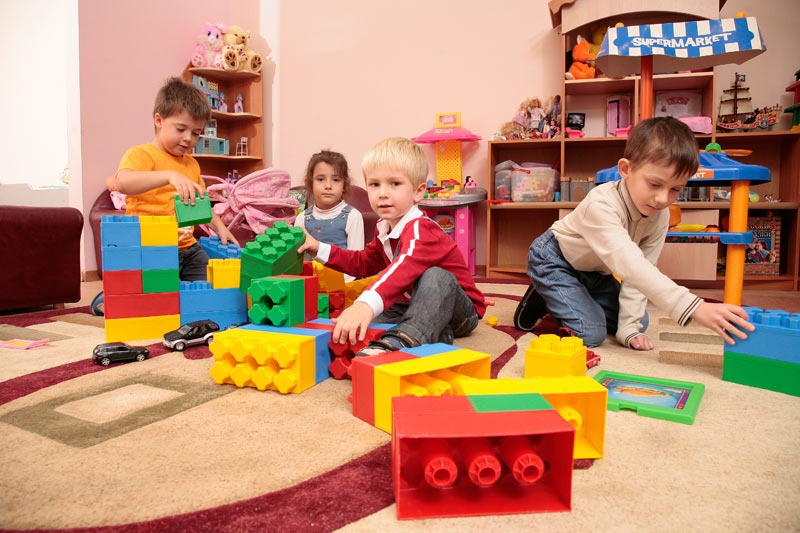
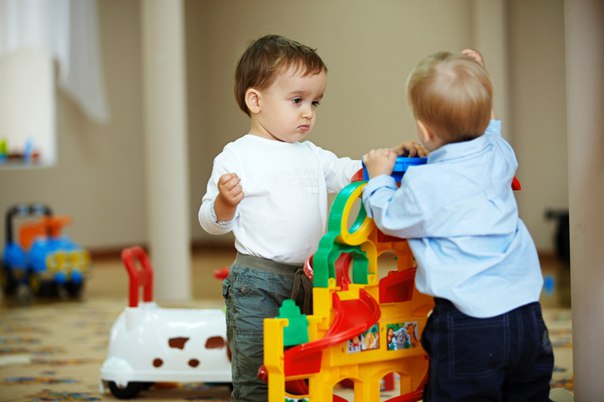
- Poor wardrobe. The most important rule is convenience. Simple fasteners, soft natural clothing fabric. Of course, it is better when your child has self-care skills. If he dresses and shoes himself, adaptation will be much easier. Intricate clothes can cause aggression of the educator, because the offspring does not understand that the adult is angry not with him, but with small buttons. As a result, he does not want to make contact with the teacher.
- Special child. For example, a fear of touching may appear when a child is afraid that they can become seriously ill if they touch strangers. Some children may not tolerate loud sounds well, and in the kindergarten, children are in constant tactile contact and noise. Also, the child may have trouble sleeping or be so active that adults do not have time to monitor him. In any case, know that your children are fine and do not need to be converted into kindergarten. You should create the most comfortable conditions for them, look for an institution that can provide them.
If you are going to kindergarten for the first time, you will probably meet your child's resistance. Changing the regime and social circle, even in adults, causes stress, what can we say about a three-year-old baby.
Look at the episode of Dr. Komarovsky's program, which is called "non-Sadikov's child." Perhaps, after watching it, it will be easier for you to understand the reasons for the child’s reluctance to attend preschool?
What should be done to facilitate adaptation?
Gradually accustom your child to kindergarten. First, come to get acquainted, look at the group and the locker. Play on the playground. Find out every day how he spent his day. Gradually, both of you will get used to it, and the baby will tell more and more. What did he do, what did he eat, who did he play with, etc. Reward good behavior, but do not buy gardening. Otherwise, later it will serve as a pretext for blackmail. "I'll go if you buy something."
Play situations that arise in the group. Suggest how you can respond to a particular action. So it will be easier to adapt, and he will know what to do in a given situation. Let me take my favorite toy from home, let it remind him of home. On weekends, do not break the kindergarten regime. Learn to share, interact with children.
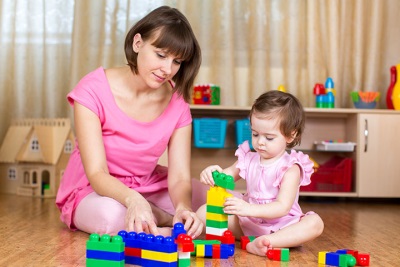 Try playing "kindergarten" with your baby before visiting the institution
Try playing "kindergarten" with your baby before visiting the institution
The baby needs to sleep. Organize his night's sleep so that he wakes up in the morning. Give him as much time as possible in the evening and on weekends. If you shift all the responsibility to the institution, thinking that they are doing well there, he may feel abandoned and unloved.
If you see that anxiety has increased greatly, the child shudders and does not sleep well at night, or all this is still accompanied by vomiting and diarrhea, you need to urgently find out the cause of such a reaction.
What can not be done?
- Do not threaten kindergarten for bad behavior. Moreover, do not say that you will not take it.
- Don't leave your child last in the group. Waiting when the children have already gone home is accompanied by sad and negative emotions.
- Don't be fooled that you're leaving for a minute. Calmly explain how the day will go, voice the main stages (breakfast, lunch, sleep). Assure of your love and promise to pick up, for example, after dinner. Of course, the promise must be kept. Support the child, sit down at his level during the conversation.
- Be Patient, do not scold for tears and refusal of food.
- Don't discuss especially in a negative way, dismissive of caregivers and the institution in general with children.
- Don't drag out goodbye hug and confidently leave. Do not run away while the child is distracted, he will see that you are not there and will be scared.
- No pills. Sedatives - for adults, of course, if there is no prescription from the attending physician. Tiny handles the situation the best he can. Give it time, everything will be back to normal when he gets comfortable.
For some tips on how to teach your child to kindergarten, see the video:
How to persuade to go to kindergarten
The child should know that kindergarten is a very important and responsible business. Everyone has their own job, mom, dad and he has a garden.
Hold back at the moment of parting, you cry - the child also cries. Show only positive emotions, joke. If the child calms down as soon as you leave, it may be better if someone else with whom he does not have such a strong emotional connection (dad, grandmother, brother or sister) takes him away. Treat with care, enjoy crafts, appliqués and brought drawings. If you refuse to get up in the morning, you can lure him with the fact that today there will be an interesting lesson with a teacher. All mothers will do something beautiful, but nothing for me.
 Avoid long goodbyes in the morning
Avoid long goodbyes in the morning
Be proud and tell everyone in the presence of a preschooler that he goes to kindergarten. Talk about how important it is and how he helps you with this.
Talk more often about how good the kindergarten is and how many interesting things there are. Beautiful toys, attentive teacher, fascinating tales. Be consistent, do not succumb to tears and persuasion, even if it seems that he cannot get used to it. He must know that it is necessary. Be firm, but without fanaticism.
Come up with something interesting. For example, on the way home, feed the pigeons or inflate balloons in a group - everyone will play and rejoice. Thus, positive emotions will be fixed.
Make a friend. Usually all the children in a group are from the same district. Meet your parents, play on the playground on the weekend, invite them to visit. Kids will make friends, will be bored and happy to see each other.
The kid does not want to go to the garden, because they offend there
He tells it himself or you noticed changes and “traces” of resentment, psychological and / or physical. If he long time I went to kindergarten with pleasure, and then suddenly began to refuse, this is an occasion to think. Discuss the situation with the child, find out in a playful way who offends him. Do not show anger, calmly clarify everything.
Conflict with children: first find out what is happening and why. Perhaps your baby is aggressive himself, and the kids are only defending themselves. Watch him when you walk in the yard, sandbox. Pay attention to how he communicates. This will help you find out the reasons for the contention.
For information on what to do in a situation where a baby is offended in a group, see the video:
It often happens that one aggressor attacks several children. Take control of the situation, he can't handle it on his own. Talk to the teacher, ask to take a closer look at the situation. Strictly talk to the culprit. Don't threaten, but tell them what not to do. Get to know his parents, perhaps together you will be able to quickly resolve the contradictions.
The next step is to contact the manager. If nothing changes, transfer the baby to another group.
Learn to defend. Of course, do not learn to fight back, otherwise the consequences will be even worse. Teach outward calm, keep your head up high, look into your eyes, speak confidently. Think of how to answer: "Don't hurt me," "I don't like it that way," "Step away."
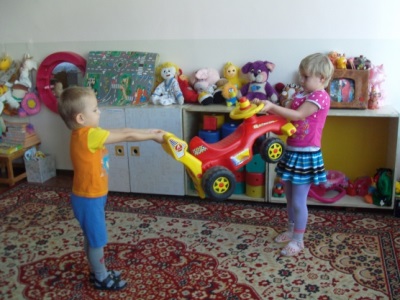 Before taking any action, you need to understand the situation
Before taking any action, you need to understand the situation
If the problem is in the caregiver
To understand that the child is offended by the teacher, the following will help:
- Ask about the problem, but don't assert. The question should be open, for example: “When you play around, what does Anna Ivanovna do?”
- Picture. Sometimes it's easier to draw than to say. Ask to draw a kindergarten, listen to explanations of who does what. This will give you some idea of what's going on.
- Games. Role-playing. Take the role of a teacher, and then offer it to your child. The way he treats you and toys is likely to take place in the group.
- Come up with a story with your child. Let the heroes be real people from the garden.
- Assess the situation appropriately. Consider it from all sides, children have a rich imagination. He may exaggerate or copy cartoon/movie behavior.
For a few tips from a child psychologist on what to do if your child is being bullied in kindergarten, see below:
Actions when you are convinced that the teacher is guilty:
- Conversation with the teacher. Without getting personal, ask if there was such a thing. Praise the teacher, show how you respect him for his work. Resolve conflict peacefully.
- When the mentor does not hear you, and the complaints continue, talk to the parents of other children. Find out if they have a similar problem.
- Contact the manager also calmly ask to check what is happening.
- If nothing helps contact the Department of Early Childhood Education. Team up with other parents and demand a replacement teacher.
Usually, adaptation takes from one month to six months, if the baby cries all day and does not want to stay in kindergarten. Think about a private institution or a nanny, persuade your grandmother or yourself, at least for a while, give up work, because health and peace of mind are very important. After a while, try again to take the baby to the kindergarten, perhaps later everything will work out.
 After a period of adaptation in kindergarten, the kids begin to miss their team at the weekend
After a period of adaptation in kindergarten, the kids begin to miss their team at the weekend
Watch a program in which the problem of reluctance to go to kindergarten is considered in sufficient detail from different angles.
Not every child will walk every day in Kindergarten with visible pleasure. After all, for this you need to get up early, the food there is different from homemade, the teachers do not allow them to do what they like, and, most importantly, there is no mother there. But to make the child want to go to kindergarten perhaps, and today we will talk about what is required for this.
Today you brought in for the first time Kindergarten your baby. Most likely, after a while this day will no longer be so bright, and your memory will send memories of it to a far corner of your consciousness. But, at the moment, you remember to the last detail the reaction of your child, the expression of his eyes when you left him in kindergarten. Let's try together to figure out what problems parents and children expect when they enter a children's institution, and learn how to get out of the current sensitive situations.
Let's consider the opinion of the educator kindergarten, which is all work time spends with children, and sees from the inside all their problems. Her name is Hope. She believes that if the baby is without visible reasons suddenly refuses to go to kindergarten, then you need to look for the reasons that provoked this. Perhaps your child quarreled with one of the children, maybe one of the other children offended him with a word or even hit him. Or it may be that the baby has a conflict with the teacher, especially if the child asks you which of the teachers will be in today kindergarten. In order to find out the real reason for what is happening, try to display together with the child kindergarten in play with toys. To do this, act out the scenario of one day he lived in kindergarten. Try to find time and talk with the caregivers of your child. Explain to them that your child is very sensitive, and it will be very good if they try to give him a little more attention. Each person is an individual. This also applies to children: one will not particularly react and take to heart if he is scolded, while the other may withdraw into himself from the slightest increase in his voice. The child will not say anything to the teacher in response, but resentment will accumulate in his soul.
What does mom think about at work?
Much is said about the stress that a child receives when one day his usual life changes dramatically. Previously, he was constantly with his mother or another close person to whom he was accustomed. All attention was focused only on his person. Now everything is different. He found himself in a completely unfamiliar and new team among other children and strange women. Mom and dad, of course, know why now their baby is forced to spend most of the day in children's kindergarten. And he himself has yet to find out what exactly the phrase means: mom goes to work. But for some reason, few people talk about the stress experienced by mothers themselves. Very often, parents are forced to give their little one to be raised in a children's institution even before he is two years old. For the child himself, this is a very difficult step, both psychologically and physically, because he still has a very strong dependence on his mother. A child can adapt much easier in a foreign team when he is already four years old. Children of this age begin to feel the need to communicate with their peers, they become interested in playing in a team. For mom does not have special significance how old is her baby, two or five. In any case, he constantly remains for her a small child, for whom she worries.
In such cases, women may be advised to leave all their anxieties at home when they go to work. With a child in kindergarten nothing will happen. Clearly plan your working day and follow this plan. So it will be easier for you to distract yourself from the thoughts that bother you.
Let's look at a real life example. Catherine, when she gave her son to Kindergarten, said that she must go to work, and his work is kindergarten. The boy was then 2 years and 7 months old. The child asked her if it was true, and she answered yes. After that, the woman had no problems sending her son to an orphanage. Every morning they get up with joy and begin to get ready for work, which each of them has his own. The kid likes that he imitates adults with at least some actions. He dreams of becoming big himself as soon as possible. In addition, the parents happily announced to all their acquaintances in the presence of the boy that their child was going to work, and he felt proud from such words.
Some women are afraid that one fine morning their little one will categorically refuse go in kindergarten. And what should they do in this case, because you need to go to work. Sometimes parents take their kids to kindergarten by force, sometimes urging them on with gentle slaps at the causal place. Parents have no excuse for such actions, especially if adults cease to control themselves. But after all, you can force the little one to go to the kindergarten without screaming and using force, and he will do this voluntarily and with visible pleasure. I would like to tell a few life stories in this case.
One mother says that in order to take her little one to kindergarten, they had to get up at half past seven, leave the house at seven in the morning and take the bus five stops. It is more than likely that the baby absolutely did not want to get up so early, especially in the first days of his new life. Mom tried every morning to tell him new invented reasons why he had to get up so early. The reasons were varied. They went to see where the buses sleep or how the sun rises, listened to the morning trill of birds and enjoyed the silence of the morning city.
In addition to talking, there are ways to get your child interested in morning walks in a different way. The woman we wrote about above allowed her little one to run through puddles during the rain and even jump on them, having put on, first, rubber boots. Almost all children enjoy this, and the anticipation of the upcoming walk helps them wake up faster. And this is not strange, because almost all parents forbid their children to play in puddles, and here such happiness. Sometimes the mother tried to interest the child in some extremely responsible business. For example, you can take candy to your teacher, or come to kindergarten faster than anyone to have time to ride on a car loved by all the children of the group. Give a child new toy, and say that it would be great if he showed it to the other children. See, your little one will eagerly run to kindergarten, because there you can brag to others about your mother's gift. For us, all of the above methods seem not so important, but for children, everything is completely different. They like to be the first and the best, they like to feel the attention of others. Parents, for their part, must believe in such interests of children.
It was not difficult for the mother to take the child to kindergarten on those days when the theater should come to them with a performance, or Santa Claus should come with gifts. The main thing is to remind him of the upcoming event, and the kid himself pulled his mother outside.
Or one more example. Son Eugenia is now three and a half years old. She chose a slightly different way to interest him kindergarten. The woman told the boy that she went to work in order to be able to buy him new toys and sweets. He, for his part, must go with the other children to kindergarten to learn new things. A mother makes a kind of contract with her son. Every day she buys him different ones, and he goes to Kindergarten and then tells her how he spent the evening.
She talks about one episode that she especially remembers. It was winter, and since it began to snow in the evening, in the morning everything around was covered with a layer of snow. The woman suggested that due to weather conditions there would be difficulties with transport, and being late for kindergarten And she didn't want to work at all. But, if something doesn't work out, it usually leads to a whole string of similar events. So it happened with Evgenia. On that day, no amount of persuasion or promises could make her son get out of bed and go with her outside. He was no longer interested in sleeping buses, and he did not want to carry any sweets to his teacher. But here, too, the mother of the child found a way out of the situation. She told her son that the evil Baba Yaga was in a hurry to get into his nursery. kindergarten to eat porridge kids. Such words had their effect, and the child began to rush in pursuit in order to save the children's good from Baba Yaga. By the way, in pursuit, he was going to fly right on a broomstick. Mom failed to convince him that the buses go much faster, and had to give away two old mops in order to save the children's breakfast. On these brooms they "flyed" to the very bus stop, and only there the woman managed to convince her son that they would not catch up with the villain on brooms, and the big bus would help them in this. The kid believed her, and they safely continued their journey to the kindergarten. For each child, parents should apply their own methods of influence, and what they will be, parents know better.
Perhaps the situation described above will be perceived by most readers as stupidity shown by a woman. And the mother believes that the son liked the story she invented, and, most importantly, he remembered it for a long time. While she and the boy were driving to kindergarten, they slightly changed the role that Baba Yaga played in this story. Now she did not want to eat the children's porridge, but on the contrary, cook something tasty for them. And she will cook for them every morning, while the boy goes to work in the nursery. kindergarten. The boy liked this story, and for a long time he told all his friends about who exactly cooks porridge for them in the kindergarten. As it turned out, Baba Yaga's culinary skills were at a fairly high level.
Any methods are good for achieving the desired result. The main thing is that before going to kindergarten, the child’s mood was good, then you will be less at work for him.
And here is another example from life, how you can interest a child in his “work”. Regina's daughter is three and a half years old. She has several proven methods in stock that help her collect the girl in the morning. At least one of them will definitely work.
Sometimes she tries to call the baby to conscience and understanding. The woman tells her that her daughter is already quite an adult girl, and she understands perfectly well that her mother is forced to go to work, because you can’t buy anything without money. She then lists everything that can be bought. Of course, the girl is not indifferent to all of the above things.
You can play a little on the daughter's property. Suffice it to say that if she so desires, then in kindergarten may or may not go, but then other children will play with her favorite toys, another girl from their group will put their things in her locker. Doesn't she need all these things anymore?
Sometimes a woman remembers other children with whom her daughter likes to play so much. After all, her friends will be very upset if she does not come to them today and does not play their favorite games. They will think that their girlfriend is sick and will miss her very much. “But you really didn’t get sick, did you? Do you remember your best friends, or do you not like them anymore?
Sometimes it helps to discuss the way forward. kindergarten. How will they do it today? Maybe my daughter wants to ride a scooter, or ride a bike. While the child has not yet grown up, you can convince him of anything with the help of conversations. Tantrums practically do not happen, and if sometimes they do, then it will be enough to wait until everything is over and try to convince the baby again.
But all of the above was the opinion of one side - mom. Let's now consider the opinions of children, why exactly they do not want to go to kindergarten, as well as the comments of their mothers about this.
Misha is 5 years old, and he has his unwillingness to go to Kindergarten explains that they offend him there, and no one wants to play with him. Mom, in turn, says that her son is a social boy, he has many friends with whom he quickly found mutual language. And his statements are just an excuse to be at home with her.
Or Dima, who is 4 years old, complains to his mother that he kindergarten they are not allowed to run through the puddles and are scolded for it. Mom said that the teachers in the new group are kind and sympathetic, but in reality everything is not so. That's why he doesn't want go in kindergarten.
What is the opinion of the boy's mother? She says that for the summer period her son was transferred to another group. But the boy categorically does not want to go there, because he does not like the new teachers. The problem was solved with the help of a grandmother, who took her grandson to her dacha for the whole summer. And in the autumn he will return to his group again to the former ones.
Serezha is 6 years old and he doesn't like going to kindergarten because there you need to sleep during the day, and there you are punished for pranks. And yet - none of the children want to play with him.
His mom says they recently changed Kindergarten, and her son was not immediately able to make new friends. Parents solved this problem by taking their son home immediately after the children had dinner.
And what is the psychologist's opinion about all the excuses that children come up with in order to don't go in kindergarten? Or maybe it's not just excuses?
All mothers react very painfully to the remarks of their child, who does not want to go to Kindergarten. This is especially depressing for her when she is forced to go to work, and there is no other way out. And the child throws tantrums every day, and the mother feels like a traitor to her child. Sometimes they consider it better to take time off from work in order to sit with the baby herself, or to call a grandmother who will sit with her grandson. But this scenario is by no means the best. First, parents should objectively figure out why their child is so reluctant to attend. kindergarten.
If these are the first days of his new life, then there is nothing strange and inexplicable in his whims. Each, even the most insignificant, change of scenery frightens the baby, and here such a shock. Parents should be patient and wait until the child adapts a little. It's best to bring him to Kindergarten for several hours, gradually increasing this time. So he will quickly get used to the new environment. Help him find friends in a new team. If possible, you can interest the baby in drawing or modeling classes, so that in kindergarten he was able to impress everyone with his skills. If you have a game at home that several children can play at once, bring it to your toddler's group. Let him tell the other children about her rules and teach them how to play. If from the very beginning parents will actively help the child adapt to a new environment and a new team, over time your little one will begin to ask for kindergarten. There he will be much more interesting than at home: there he can play with other children, practice drawing or learn another rhyme.
If you have already gone to a children's institution before, but now for one reason or another you are forced to change it, then the child adapts to a new place much faster than the first time. Although the stages that he will have to go through are no different from those that he went through when he first came to kindergarten. Try to take a vacation and help your little one get used to the new place.
There may also be such a situation that the child has been going to a children's institution for several years, and suddenly, for no apparent reason, declares that he will not go there anymore. In this case, you need to understand the current situation, because for this behavior of the baby, there must be a fairly good reason.
First, make sure that your son or daughter is completely healthy and has had a good night's sleep. Sometimes it is the poor health that can cause a child to refuses to go in Kindergarten. It should be noted that there may not be visible signs of the disease, and the baby does not show any complaints.
If the child is completely healthy, you need to look for another reason for such actions. If you try to ask him directly about what is happening, you will most likely not achieve anything. Try to approach the issue from a distance. Tell a story from your life, and if you don't remember, show acting skills. You can tell that when you went to kindergarten, you had a very close friend with whom you constantly played. But once there was a serious quarrel between you, after which the desire to go to garden you have lost. And it is possible in another way. For example, tell me what's in your kindergarten there was a teacher who was very kind, and whom you loved. But one day, for a minor offense, she yelled at you a lot, and that day you firmly decided that you would not go there again. If among the examples that you tell the baby is the real reason why he behaves this way, the child himself will immediately tell you about it. When the reason is clear, act according to the circumstances. After the baby’s story, you can continue your “ life story". Tell me that soon, as soon as you came to the kindergarten, you made peace with your girlfriend, and the relationship between you did not deteriorate at all. Maybe the kid will follow your example.
If you still can’t figure out the reason for your child’s behavior on your own, talk to his teacher. Arrange a time when you can come early and talk about possible reasons the situation that has been created.
It also happens that the unwillingness of the child to go to kindergarten multiplies day by day, and with time becomes clear and stable. The most likely reason in this case would be, most likely, that he was simply bored there. Perhaps the educators do not work with children at all, they do not have collective games. If this is true, then try to put yourself in the place of your little one. I would like you to sit locked up all day and do nothing, and this, moreover, that the children themselves play in some kindergartens prohibited - rules. After all, at home, the child will be much better and more fun. There are his toys here, you can watch cartoons on TV, especially since his beloved mother is always there, ready to play with him at the slightest request. If this is the situation with your baby, try to tell him what to do and how to entertain yourself and other children. You can give him drawings or plasticine with you. But the best thing you can do for him is to find another kindergarten where they will work with children, as it should be.
If you are trying to persuade a child of 5-6 years go in garden, put pressure on his conscience, look, do not go too far. If you tell him that you have to go to work to earn money, and his duties include visiting the nursery garden, think what imprint your words will leave in the soul of the baby. Most likely, he will not be very pleased to hear this, although such a statement will have an effect. Parents should not strive to ensure that the child takes walking in kindergarten as their duty or for granted. They should help him find the nursery kindergarten something that he is really interested in and that he likes to go there. In order to achieve this effect, sometimes it is enough to look for another kindergarten, which is very difficult in modern conditions.
In this case, we start from how the question is posed. If "the child does not want to walk", this does not mean at all that he will not be able to do this. Look around. You have met a healthy child who would not walk by the age of three. This doesn't happen. And counting the months and comparing your baby with others is just another reason to get nervous. This cannot be done for several reasons:
- first of all, you spoil your nerves and mood, which means that your child will also feel it and answer you bad mood, whims or unreasonable crying
- such a comparison sets you up for the fact that your child is somehow worse than others. Such thoughts have a depressing effect on everyone, and underestimating your own child can further affect his self-esteem. The child is insecure bad start independent life.
- Others, after listening to your claims, will also begin to believe that if child wants to walk, it is underdeveloped. In no case should you give such a reason for a negative attitude towards the baby into the hands of not too friendly people.
Be patient and look at everything with optimism. Perhaps the fact that the child does not want to learn to walk at the same time as everyone else is the first manifestation of his originality and difference from others.
If, nevertheless, there is not enough patience to wait for the first steps, then gradually try to encourage the child to do so.
- When walking by the handle, do not hold him, but let him hold on to his finger on his own. In this case, if the baby is distracted and wants to reach for something that is on the side, it will be easier for him to tear himself away from his parents and take the first step.
- let's baby more possibilities for movement. In the event that he moves freely around the apartment, and not just sits in the arena, then he has much more reasons for walking independently.
- Play outdoor games with your baby more often, call him to your place, ask him to bring toys or things that he likes.
- You can and should try provocative actions. At a time when the child is standing on his feet and is far enough from his parents, offer him a new or favorite toy. Very often, babies, in a hurry to get the desired item, forget that they can crawl, and take their first steps.
But do not be too intrusive, otherwise the child will figure out all the tricks and his stubbornness can only increase. If , then don't force it. Just change your attitude to the situation, and set yourself a different task, for example, to teach a child to eat with a spoon. Most often, the situation changes dramatically precisely when it is no longer considered a problem.
